Rosyth dockers recognised for role in Falklands War
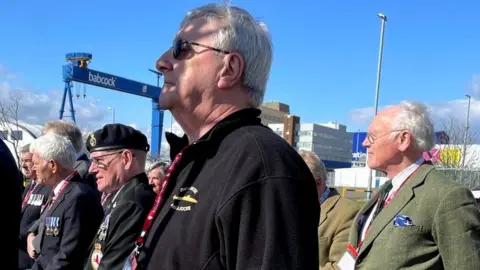 BBC
BBCRosyth Dockyard workers have been recognised for their role in the Falklands War, 40 years after the conflict began.
The Babcock yard on the Forth prepared Royal Navy ships during the invasion in 1982 and also turned some fishing vessels into minesweepers.
Royal Navy personnel, veterans and dockyard workers were among those who attended the unveiling of a plaque.
The Lord-Lieutenant of Fife, Robert Balfour, said Rosyth played a key role.
"Victory may have been won by the fighting men but it was only made possible by the work of those dockies," he said. "It's a testament to the combined efforts of military and civilians alike, all pulling in the same direction, with the same sense of unity, that we achieved what we did."
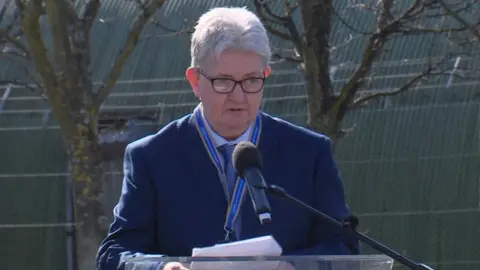
Dockyard worker Alf Ramsey remembered working in Rosyth when the war broke out, leading to the sudden refitting of ships.
He said: "Rosyth dockyard played a key role in preparing Royal Navy ships for the conflict and saw frenzied activities as the stores, equipment and service personnel were assembled for the journey to the South Atlantic."
He said that following the discovery of sea mines at Port Stanley, it was decided that a number of trawlers should be turned into minesweepers.
"Five were requested, some of which were fishing on the high seas when they had word," he said. "Each was told to proceed to Rosyth where they were met by freezer trucks and emptied of their catch and fishing gear before being fitted out as minesweepers - and all within a few days."
He said Rosyth undertook the "massive task" of turning the trawlers into makeshift warships which involved the installation of compatible communication systems, refuelling-at-sea equipment and deck fittings.
On completion, they were crewed entirely by Royal Navy personnel and operated as the 11th Mine Counter Measures Squadron.
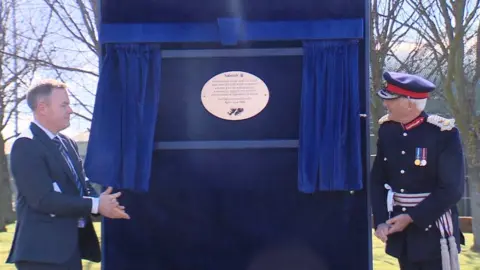
Mr Ramsey added: "Rosyth dockyard personnel worked around the clock, 16 hours a day, seven days a week and the spirit of camaraderie throughout the yard was second to none, putting national interests first, showing what could be achieved in short order.
"This enabled the Royal Navy to respond quickly. When the ships returned to Rosyth from the Falklands, the entire yard, along with families of service personnel, lined the dockside to cheer them back in."
More than 50 current and former Babcock employees, Royal Navy personnel, armed forces veterans and representatives from the local community attended the ceremony.
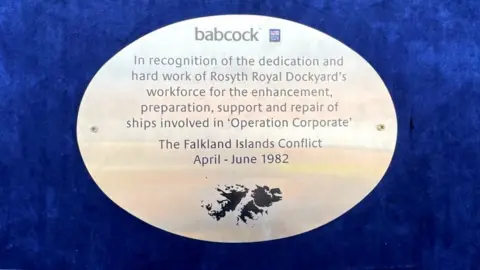
Brigadier Andy Muddiman, the Royal Marines naval regional commander for Scotland, said: "It's very gratifying to see, as we begin the Falklands 40th anniversary period here in Scotland, that we are quite rightly focusing on the significant efforts of our colleagues who worked in the Rosyth Dockyard at the time.
"It was down to their efforts and those of other dockyard personnel around the country, that Britain was able to achieve such a huge undertaking.
"To refit, and in some cases completely outfit from scratch, a number of merchant ships, in just a few days, for a purpose they hadn't been designed for, to then sail some 8,000 miles and operate as part of a quickly-created taskforce within a war zone, was an incredible task.
"As much as it was the soldiers, sailors, marines and airmen who fought the war, they couldn't have done that without the extremely important preparation."
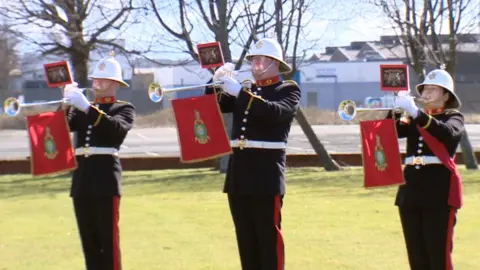
Craig "Mac" McDermott, who lives at the Erskine care home for veterans in Edinburgh, was on board the HMS Antrim which served as the flagship during the recapture of South Georgia in April 1982.
Reflecting on the brutal conflict that claimed the lives of more than 900 men, he said: "It makes me cry. I was 17. I was a boy, fighting other boys."
'It was quite emotional'
Veteran Norman McDade, 60, known as Mac, was onboard the Plymouth at the age of 20.
He recalled the day he and his crew returned to Rosyth.
"It was quite something," he said. "We had a lot of small boats with us on the way in, lots of people up on the Forth bridges.
"I remember people on top of the railway bridge, right on top of it, waving at us as we came through. It was quite emotional when we came in because I could see my family, they had a banner up.
"It was quite a welcome home, the whole dockside was full of people."
The Plymouth was hit by four 1,000lb bombs on 8 June 1982, however, none of them exploded.
